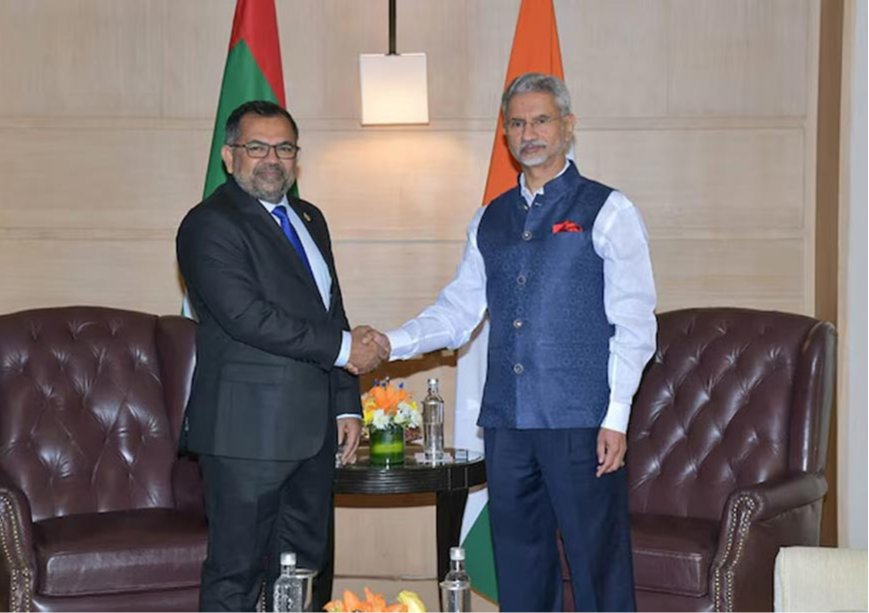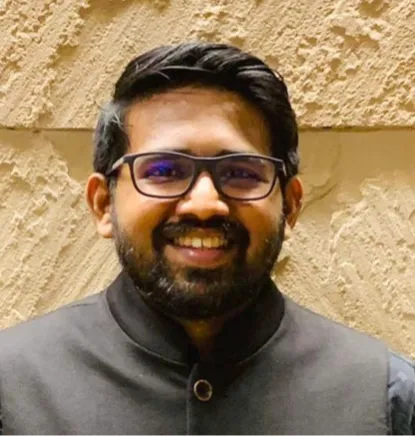-
CENTRES
Progammes & Centres
Location
India has been understanding of the Maldivian government’s new policy, but it expects the island nation to respect Indian sensitivities and equally uphold its commitment to bilateral ties

Maldivian Foreign Minister Moosa Zameer’s visit to India from the 8 - 10th of May marks the first high-level visit from the island nation since Mohamed Muizzu’s ascension as the country’s president in November 2023. During the visit, the Foreign Minister met his Indian counterpart to review the relationship and enhance further co-operation. He also requested India for budget support to which New Delhi has reciprocated positively. The development comes when relations between both countries are strained, with the Muizzu government diminishing ties with India and embracing China.
While India has been accommodative of the new government, it expects the Maldives to respect Indian sensitivities and equally uphold its commitment to bilateral ties.
Since coming to power in November, Muizzu has embraced a “Pro-Maldives” policy that aims at reducing dependence on India, doubling down on Maldives’ relations with China, and diversifying relations with other countries. This policy is a product of his domestic politics and nationalist posturing against India; ideological and personal leanings toward China, and to leverage its crucial positioning in the Indo-Pacific to improve ties with others and further its interests.
Muizzu was the first to break the tradition of Maldivian Presidents choosing India as a destination for their maiden visit. He visited Turkiye on an official visit in December 2023 and China on a state visit in January 2024. In addition, he demanded India withdraw its 76 troops - deployed to look after the helicopters and the Dornier aircraft. He has also decided not to renew the hydrography agreement with India, which will expire in June.
India has also not been offered any new projects, while Muizzu has agreed with China to expedite the BRI projects, and implement the FTA, and is granting them community development, housing, and infrastructure projects.
On the other hand, he has signed a defense pact with China, imported drones from Turkiye with the former training its drone pilots, and also permitted military/surveillance vessels from Beijing and Ankara to dock in the country. India has also not been offered any new projects, while Muizzu has agreed with China to expedite the BRI projects, and implement the FTA, and is granting them community development, housing, and infrastructure projects. Maldives is also diversifying trade, investments, and health-sector co-operation from India.
On its part, India has been accommodative of Muizzu’s foreign policy and his demands. For security, strategic, and status reasons, India has always maintained its influence in South Asia and the Indian Ocean. Any instability and the presence of hostile powers in the region will have repercussions for India, and this makes the Maldives a difficult country to ignore or alienate. India has thus used its Neighbourhood First and SAGAR (Security and Growth for All in the Region) policies to address its neighbour’s needs and promote connectivity, economic growth, and security in the region.
As a result, New Delhi has embraced pragmatism and attempted to work with the new government rather than pushing it closer to China. India proposed a high-level core group to discuss prospects of bilateral cooperation and withdraw 76 Indian soldiers and replace them with “technical personnel.” Despite Maldives’ anti-India tilt, India raised its development assistance to the Maldives by 50% - increasing it from Rs 400 crore to Rs 600 crore, and also increased its export quota of certain food commodities by 5% - the highest since the 1981 arrangement between both countries.
The latest meeting, however, indicates that despite obliging with the island nation’s policy, Muizzu’s tilt to China is testing New Delhi’s patience. During the meeting, Maldives discussed the possibilities of Muizzu’s visit to India and requested a rollover of $150 million loan, one-third of which is set to mature in May 2024. India has reciprocated this request by extending a $50 million treasury bill by a year without any interest rates. India’s response demonstrates its accommodative policy, especially as the Maldives’ economy continues to be in deep debt distress. However, by stating that the ties are based upon “mutual interests and reciprocal sensitivities” and “It is in the common interest of both countries to reach an understanding on how best to take the bilateral relationship forward,” India has made it clear that it is not its sole responsibility to uphold this relationship.
India has reciprocated this request by extending a $50 million treasury bill by a year without any interest rates. India’s response demonstrates its accommodative policy, especially as the Maldives’ economy continues to be in deep debt distress.
It is no coincidence that the visit, intended to assess the strained relations, closely follows two crucial developments: India fulfilling the demand of troop withdrawal and Muizzu consolidating his power with the recently held parliamentary elections. India is sensitive to Maldives’ interests but remains precarious of Muizzu’s wooing to China. India hopes that the new regime, with a supermajority in the parliament, could afford flexibility and embrace a pragmatic approach rather than acting at the behest of China.
India realizes that its geographical proximity and regional interests make it a better and more benign development, trade, and security partner for the Maldives than China. But, it also understands that the region today is at the heart of Sino-Indian contestation, in which smaller countries exercise their agency to further their interests. It has, therefore, been understanding and accommodative of its neighbours and their needs. Nonetheless, India expects them to respect its redlines and sensitivities. After all, it takes reciprocity of sensitivities to bolster a relationship.
This commentary originally appeared in Moneycontrol.
The views expressed above belong to the author(s). ORF research and analyses now available on Telegram! Click here to access our curated content — blogs, longforms and interviews.

Aditya Gowdara Shivamurthy is an Associate Fellow with the Strategic Studies Programme’s Neighbourhood Studies Initiative. He focuses on strategic and security-related developments in the South Asian ...
Read More +